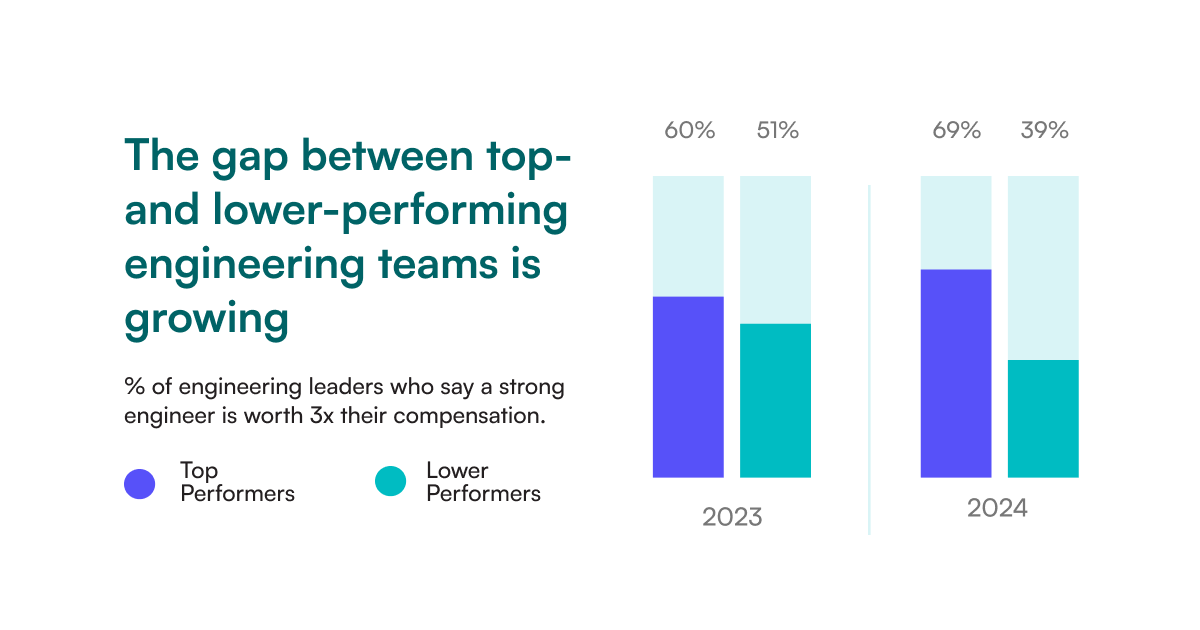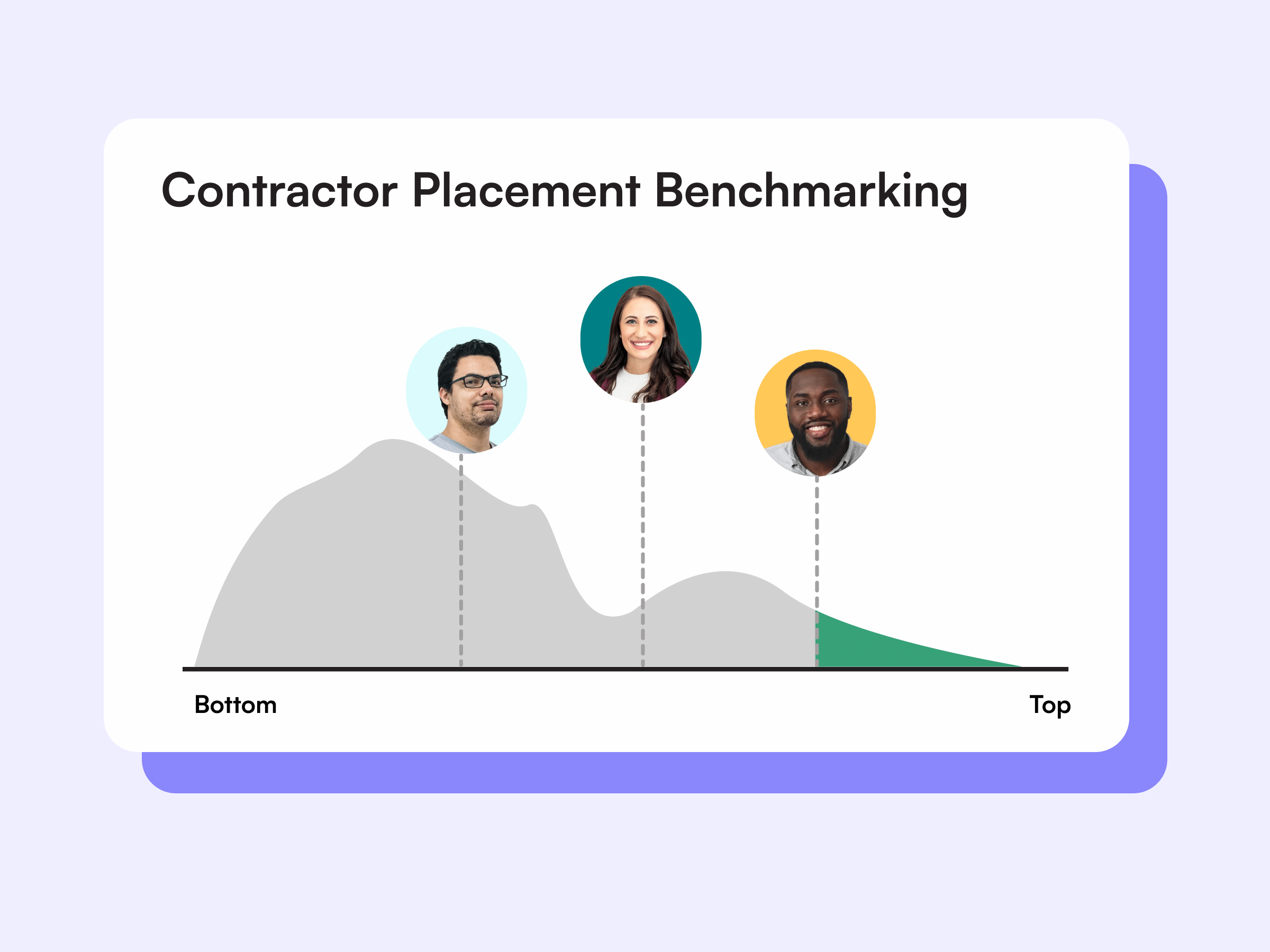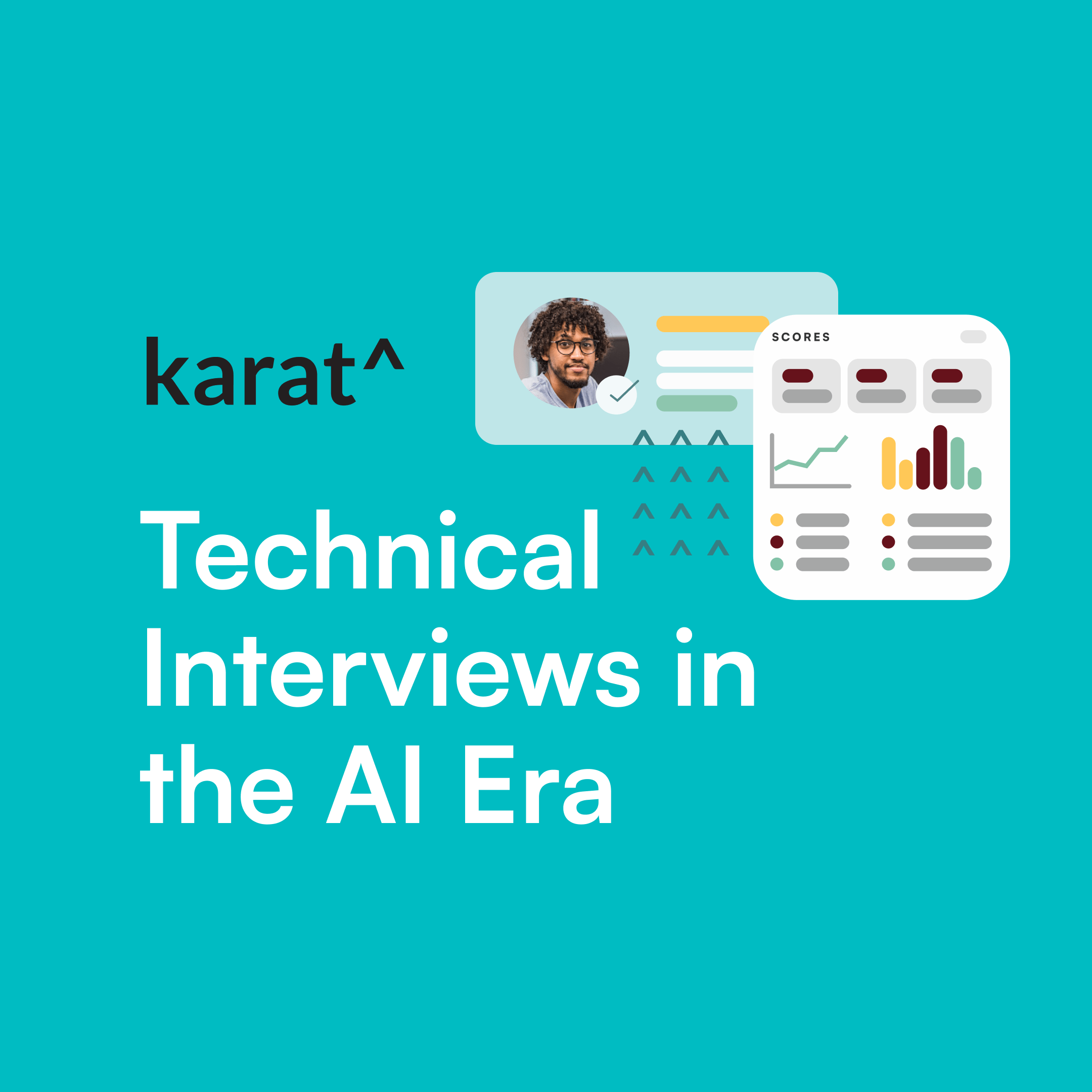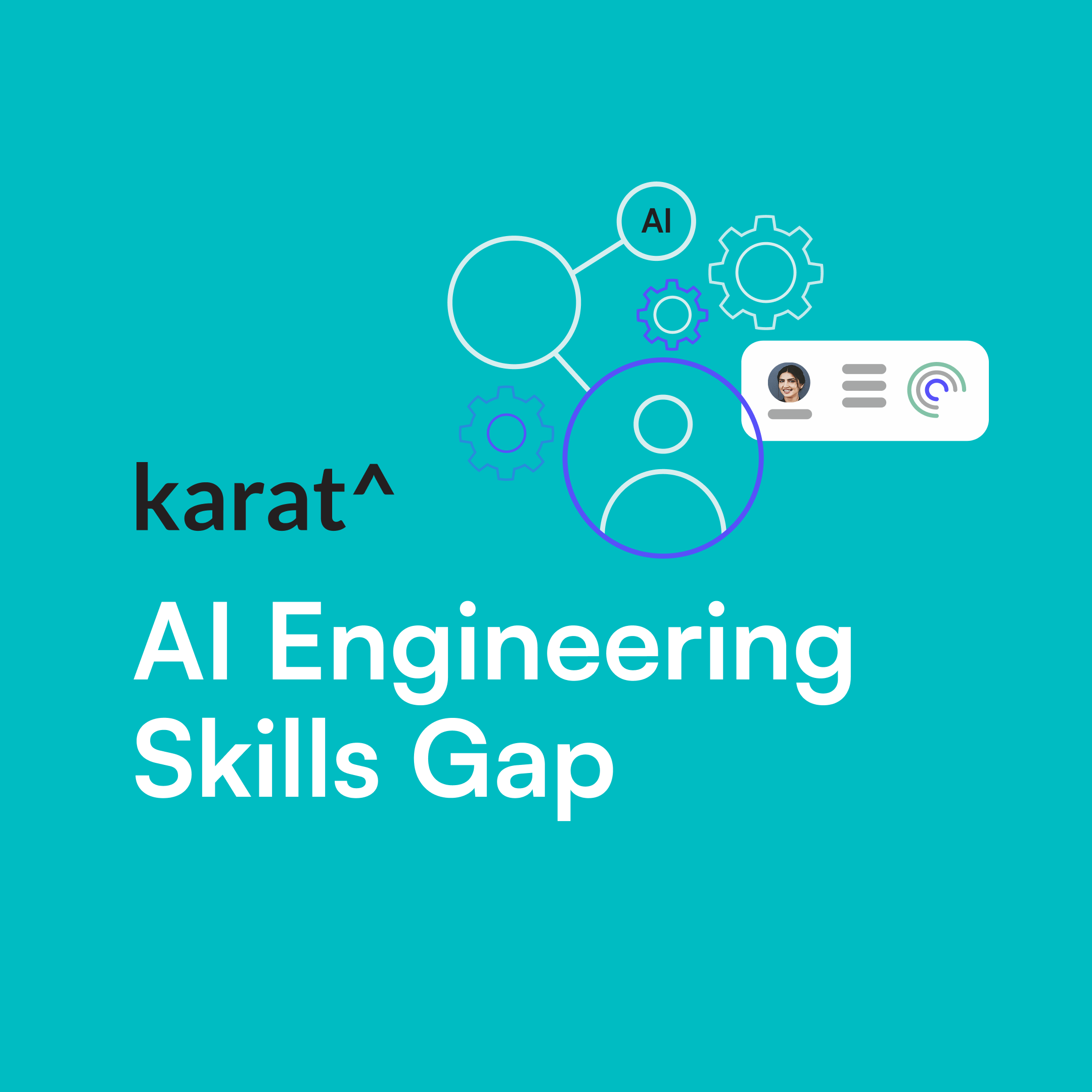AI Hiring
11.21.2024
How AI Is Changing Software Engineer Hiring Heading Into 2025

The Karat Team


Recent advancements in generative AI (GenAI) have made it possible for AI to perform some of the same tasks that software engineers do. Many believe that AI will decrease the need for software engineers as a result. Karat’s 2024 Tech Hiring Trends surveyed software engineering leaders and found the opposite is happening — engineers are actually increasing in value. The fourth annual report shares how AI is impacting the value of software engineers and whether engineering leaders are incorporating AI into their teams’ work. Here’s a look at some of the key findings.
Top-Performing Companies Place a Higher Premium on Software Engineers
Companies that are considered Top Performers were more likely to place a high multiple on the value that strong software engineers (SWEs) create for their organization.
Top Performers: very satisfied with the job performance of their company’s software engineering hires AND very confident their company will meet their software engineer hiring target for 2024
Lower Performers: less than very satisfied with the job performance of their company’s software engineering hires AND/OR less than very confident their company will meet their U.S. software engineer hiring target for 2024
While 69% of U.S. Top Performers said that a strong engineer is worth at least 3 times their total compensation, only 39% of Lower Performers agreed. A little over half (52%) of U.S. Top Performers said strong engineers were worth at least 4 times their total compensation compared to 18% of U.S. Lower Performers. The difference was even larger when it comes to the value of average engineers, with 58% of U.S. Top Performers saying their average engineers were worth at least 3 times their total compensation and 17% of Lower Performers agreeing.

Additionally, U.S. Top Performers were significantly more likely to cite that average engineers were worth at least 3 times their compensation in 2024 than in 2023 (58% vs. 45%, respectively). This can likely be partially attributed to either the last two years of rising hiring standards or productivity gains that are being made through the implementation of new AI tools.
Strong engineers continue to produce value, with 20% of U.S. engineering leaders saying that a strong software engineer is worth at least 5 times their total compensation — up from 13% last year.
Even with GenAI’s ability to write code and the economic uncertainty that followed the COVID-19 pandemic, companies recognize the importance of software engineers. Two-thirds of U.S. engineering leaders (66%) strongly agree that “hiring strong software engineers contributes to my company’s success.” This is a significant increase from the 56% who said the same in 2023. About 2 in 5 U.S. engineering leaders even strongly agree that “software engineers are more valuable than capital.”
Top-Performing Engineering Leaders Are Prioritizing AI Roles and Skills
With the boom in AI, engineering leaders are responding by increasingly prioritizing AI engineering roles. The share of U.S. engineering leaders that are hiring for AI engineers is 60%, compared to 35% last year. Top Performing companies are significantly more focused on AI engineers compared to Lower Performers (66% vs. 55%).
Companies, especially Top Performers, are also prioritizing specific AI-related skills in 2024. The three most highly sought after skills by U.S. engineering leaders are AI engineering (74%), integrating AI functionality into products via API (62%), and data science (58%). Many are also prioritizing other AI skills including leveraging AI tools while coding (56%), training new AI models (55%), machine learning (54%), interpreting or analyzing AI outputs (52%), and prompt engineering (33%).
Compared to Lower Performers, Top Performing U.S. companies are also significantly more likely to be looking for AI engineering (87% vs. 61%), integrating AI functionality into products via API (72% vs. 53%), training new AI models (66% vs. 44%), leveraging AI tools while coding (63% vs. 50%), interpreting or analyzing AI outputs (61% vs. 44%), and prompt engineering (44% vs. 23%) when hiring software engineers.
Although adoption of AI tools is fairly new, there’s a stark contrast in the hiring performance of companies that have been faster to implement these technologies. While half of U.S. engineering leaders strongly agree that “SWEs at their company leverage AI tools in their day-to-day jobs” and/or “SWEs are allowed to leverage AI tools in their technical interviews,” this is especially true among Top Performing companies. Over two-thirds (69%) strongly agree with either statement, but only a third of Lower Performing companies agree (33% and 32%, respectively).
In a similar vein, the vast majority of U.S. engineering leaders (86%) believe AI tools are making SWEs at their company more productive. Nearly all Top Performing companies (94%) say this, but significantly fewer Lower Performing companies (79%) feel the same.
Getting Ahead of the Competition for AI Talent
This AI hiring boom has resulted in fierce competition for a small pool of skilled and experienced AI engineers. This is not the first innovation boom we’ve seen though. To successfully hire in this market, we can apply the same strategies that have worked during similar times.
The current rush for AI talent is similar to the mobile app development boom in the early 2010s. Back then, the surge in mobile devices created an urgent demand for mobile app developers, but there was a limited pool of experienced developers that led to high competition and increasing salaries. Hiring was often unsuccessful because of poor hiring strategies and poorly written job descriptions.
Adopt a Hybrid Approach
To overcome these challenges, companies adopted a hybrid approach that involved targeting a select number of expert hires and upskilling existing engineers. This same approach can be applied to AI talent.
Hiring only a few highly skilled AI engineers allows you to reduce your reliance on bringing in external talent, and you can leverage these experts to help train existing engineers. In addition to receiving mentorship from the hired AI experts, engineers that you currently employ can further develop their AI skills through intensive training programs, online courses, and workshops.
There are additional benefits to this hybrid approach. By leaning into upskilling, companies foster a culture of continuous learning and adaptation. As the AI and broader tech landscape is constantly evolving, this is particularly useful. Investing in your existing employees also improves employee satisfaction and retention, as they’ll have opportunities to grow within your company instead of looking for new opportunities elsewhere.
Create Realistic Job Descriptions
Identifying AI talent is the first step in hiring, and job descriptions play a major role in helping you attract the right candidates. Clear and realistic job descriptions that outline the skills and responsibilities will reduce the likelihood of hiring mismatches.
While it may be tempting to look for engineers with significant experience in AI, the reality is that a significant portion of AI engineering roles can be filled by full-stack software engineers who are given the appropriate training. The skills needed for integrating AI or building AI products are substantially the same as those needed for building other applications, and the differences can be easily learned by a strong engineer.
Implementing these insights and tips can help you build a successful hiring strategy for AI talent, as well as a workforce that can keep up with future AI advancements. Learn more about how AI is impacting software engineer hiring and uncover the best practices of Top Performing companies by downloading the 2024 Tech Hiring Trends report.
Related Content

Contractor Hiring
01.28.2026
For most financial services organizations, software contractors aren’t optional. Whether it’s modernizing core systems, accelerating digital initiatives, or scaling delivery capacity, CIOs rely on IT Service Providers (ITSPs) to keep projects moving. But as many leaders have learned the hard way, contractor quality often fails to meet expectations. Last summer, Karat launched the first Partner […]

AI Hiring
01.21.2026
AI is changing technical hiring by accelerating every stage of the funnel and making it harder to identify genuine software engineering skills from AI-assisted output. Candidates can now easily produce polished resumes and correct interview answers, even if they lack the necessary skills or knowledge. This degrades hiring signals and is forcing companies to rethink […]

AI Hiring
01.14.2026
Conventional wisdom about AI’s impact on employees is that it acts as an equalizer. It’s expected to offset employees’ or skill gaps, but our data shows that isn’t the case for software engineers. AI is actually a multiplier. Strong engineers who can leverage AI are producing outsized value, which means the gap between them and […]